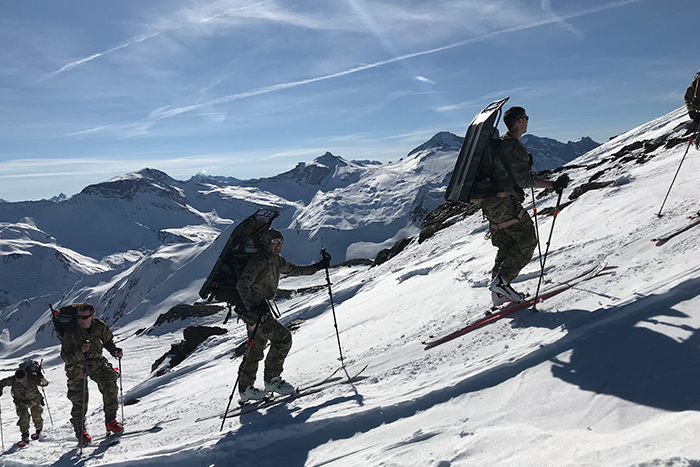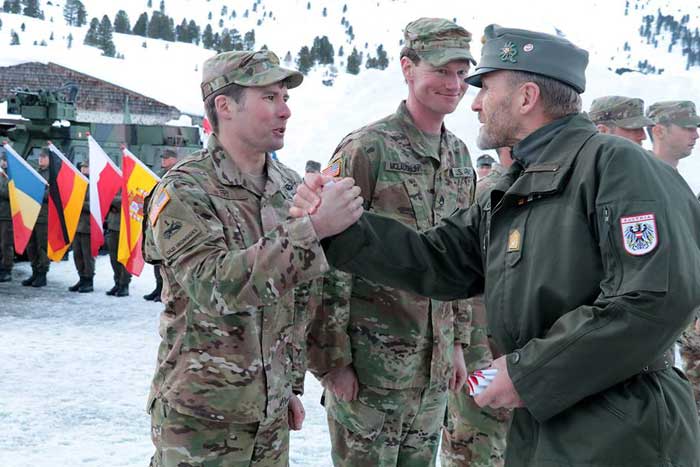Mental Durability

Photos courtesy of Austrian Armed Forces Public Affairs.
by Nathan Fry '06
In February 2019, I was racing as a member of the U.S. Army’s first Edelweiss Raid ski team in the Tyrolean Alps of Austria. Billed as the unofficial world championship for international mountain troops, the Edelweiss Raid is a 48-hour ski mountaineering race that covers 40+ kilometers and 4,000 meters of elevation gain, all with a full military pack and weapon.
The weather was amazing. The scenery was breathtaking. And, in the early dawn alpenglow of the second morning of the race, I felt my feet begin to delaminate. Twelve hours later, only two kilometers from the finish line, the blisters had become so painful that I began to sweat from the mental exertion of moving one foot in front of the other. Later, after the adrenaline receded, I could barely walk. Despite this, our team crossed the finish line together, placing 13th out of an international field of 23 teams and becoming the first team to place in the race in its first year.

What builds this type of mental tenacity and drive to succeed, despite obstacles and pain? I can trace this refusal to quit back to a single formative experience nearly 15 years ago at Dickinson. It was fall 2004, and fellow ROTC cadet Bob McDonough ’06 and I were racing through the wooded hills of Fort Indiantown Gap on a timed orienteering course. The race was an event in the Ranger Challenge competition, which no Dickinson team had ever won. But that year the championship was within our grasp. We had a single orienteering point left to find and little time remaining—we would have to run, find the point and then sprint a kilometer to the finish line to beat the clock. With only 500 meters to go, we ran out of time. Crushed and disheartened, we began to walk toward the finish.
As we crested the hill and the finish line came into view, something seemed wrong. Spectators were yelling wildly, motioning for us to hurry. The large fluorescent timing clock came into focus. My watch was wrong—we had 30 seconds remaining. Bob and I broke into a wild sprint for the finish line, crossing seconds after time expired. We were disqualified.
Our Dickinson education encourages us to reflect on the usefulness of what we learn, and one key aspect of usefulness is adaptability, or being able to apply a single tool in many different situations. But in reflecting on that moment of confusion and failure in 2004, I discovered another key trait of usefulness—durability. Even if a tool is adaptable, it cannot be fully useful if it breaks after only a single application. In the aftermath of our miscalculation, Bob and I realized that had we kept running and pushed forward in uncertainty, we could have transformed what seemed to be defeat into an unexpected victory.
When we are using our Dickinson education to push the limits of possibility—whether in a business, in a science lab or on a battlefield—we must expect that our boldness is going to meet resistance, whether from the environment, our peers or our competitors. We should not be surprised when we encounter friction but rather when we don’t encounter it. To see our useful education reach its full capacity, we must also cultivate the mental durability to keep pushing through the friction, perhaps even when failure seems certain.
In the case of the Ranger Challenge competition, the team rallied mentally. Despite our zero-point score in the orienteering event, we scored high enough in the other events to become the first Dickinson ROTC team to win the competition. But the real prize wasn’t the trophy—it was the realization that the boldness of a vision will go nowhere without the mental durability to see the plan through the friction and to the end. Be bold, expect resistance and keep pushing on.
Nathan Fry ’06 is the training division chief at the U.S. Army Mountain Warfare School, a lecturer at the University of Vermont’s Department of Community Development and Applied Economics and an American Mountain Guide Association Apprentice Alpine and Rock Guide. Nathan spent seven years in the activeduty Army after graduating from Dickinson with a degree in Russian and English language and literature. He also earned a master’s in natural resources from the University of Vermont. In 2006, Nathan married fellow Dickinsonian Kimberly Dingman Fry ’06. They live on a working farm in Vermont with their three children.
Read more from the summer 2019 issue of Dickinson Magazine.
TAKE THE NEXT STEPS
Published August 15, 2019